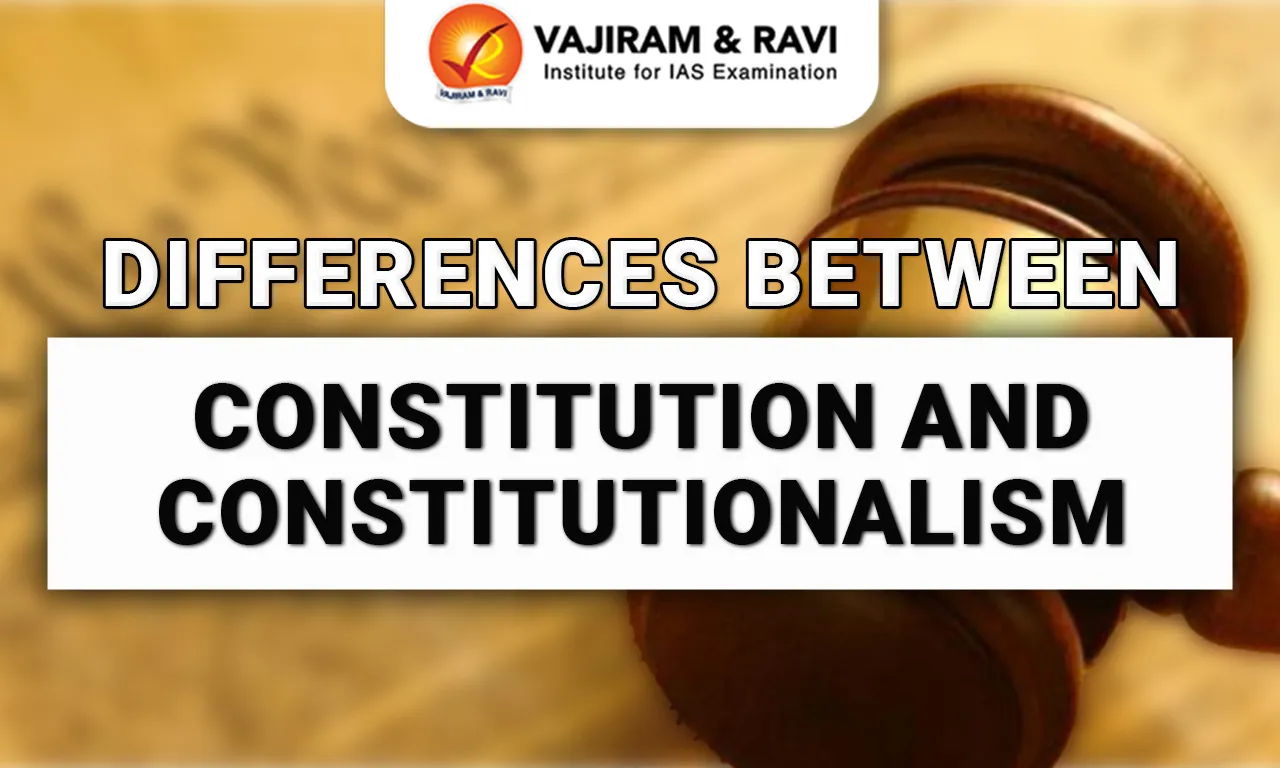The concept of Constitution and Constitutionalism are closely related as the Constitution stands as the highest level of legislation and form of law setting the framework for the governance in a country whereas Constitutionalism is an idea that the power of the state must be limited by law to protect the freedom of an individual. In 1215, King John signed the Magna Carta, limiting the authority of the British monarch. Later, in 1689, King William III approved the English Bill of Rights, further strengthening legal limits on power.
Constitution
A Constitution is the supreme law of a country. It lays down the basic structure of the government, the distribution of powers among different organs, and the fundamental rights and duties of citizens. In simple terms, it’s a rulebook that defines how a state functions.
India’s Constitution, adopted in 1950, is a detailed document that outlines the framework for governance, protects civil liberties, and ensures the separation of powers between the Legislature, Executive, and Judiciary. It also includes provisions for emergency powers, amendment procedures, and schedules detailing various administrative and political divisions.
A Constitution may be written, like in India and the US, or unwritten, like in the UK. Regardless of the form, it serves as the legal foundation of the state.
Constitutionalism
Constitutionalism is a philosophy that limits the government under the Constitution where the exercise of the power is limited by the law ensuring the authority exercises their powers responsibly and within the limits.
At its core, Constitutionalism is about accountability, checks and balances, rule of law, and protection of individual rights. It implies that even the government must operate within the boundaries set by the Constitution, and no authority is above the law.
For instance, while a Constitution may grant the Parliament the power to make laws, Constitutionalism ensures that these laws respect fundamental rights and democratic principles.
Difference between Constitution and Constitutionalism
The Constitution is the legal document which determines the limitation to the power of the government, on the other hand Constitutionalism is the concept of limiting the outreach of the state. The table below includes the Difference between Constitution and Constitutionalism:
| Difference between Constitution and Constitutionalism | ||
| Basis | Constitution | Constitutionalism |
|
Definition |
A legal document that outlines the structure and powers of government |
A political philosophy that ensures power is exercised within constitutional limits |
|
Nature |
Legal and structural |
Ideological and ethical |
|
Focus |
What the government can do |
What the government shouldn’t do |
|
Presence |
Every country may have a constitution |
Not every country follows constitutionalism |
|
Guarantees |
Grants power and rights |
Ensures limitation of power and protection of rights |
|
Example |
Indian Constitution |
Judicial review, fundamental rights enforcement, limited government |
Last updated on February, 2026
→ UPSC Notification 2026 is now out on the official website at upsconline.nic.in.
→ UPSC IFoS Notification 2026 is now out on the official website at upsconline.nic.in.
→ UPSC Calendar 2026 has been released.
→ Check out the latest UPSC Syllabus 2026 here.
→ Join Vajiram & Ravi’s Interview Guidance Programme for expert help to crack your final UPSC stage.
→ UPSC Mains Result 2025 is now out.
→ UPSC Prelims 2026 will be conducted on 24th May, 2026 & UPSC Mains 2026 will be conducted on 21st August 2026.
→ The UPSC Selection Process is of 3 stages-Prelims, Mains and Interview.
→ Prepare effectively with Vajiram & Ravi’s UPSC Prelims Test Series 2026 featuring full-length mock tests, detailed solutions, and performance analysis.
→ Enroll in Vajiram & Ravi’s UPSC Mains Test Series 2026 for structured answer writing practice, expert evaluation, and exam-oriented feedback.
→ Join Vajiram & Ravi’s Best UPSC Mentorship Program for personalized guidance, strategy planning, and one-to-one support from experienced mentors.
→ UPSC Result 2024 is released with latest UPSC Marksheet 2024. Check Now!
→ UPSC Toppers List 2024 is released now. Shakti Dubey is UPSC AIR 1 2024 Topper.
→ Also check Best UPSC Coaching in India
Difference between Constitution and Constitutionalism FAQs
Q1. Can a country have a constitution without following constitutionalism?+
Q2. Why is constitutionalism important?+
Q3. Does constitutionalism require a written constitution?+
Q4. How does constitutionalism work in India?+
Q5. What happens when constitutionalism is ignored?+






















